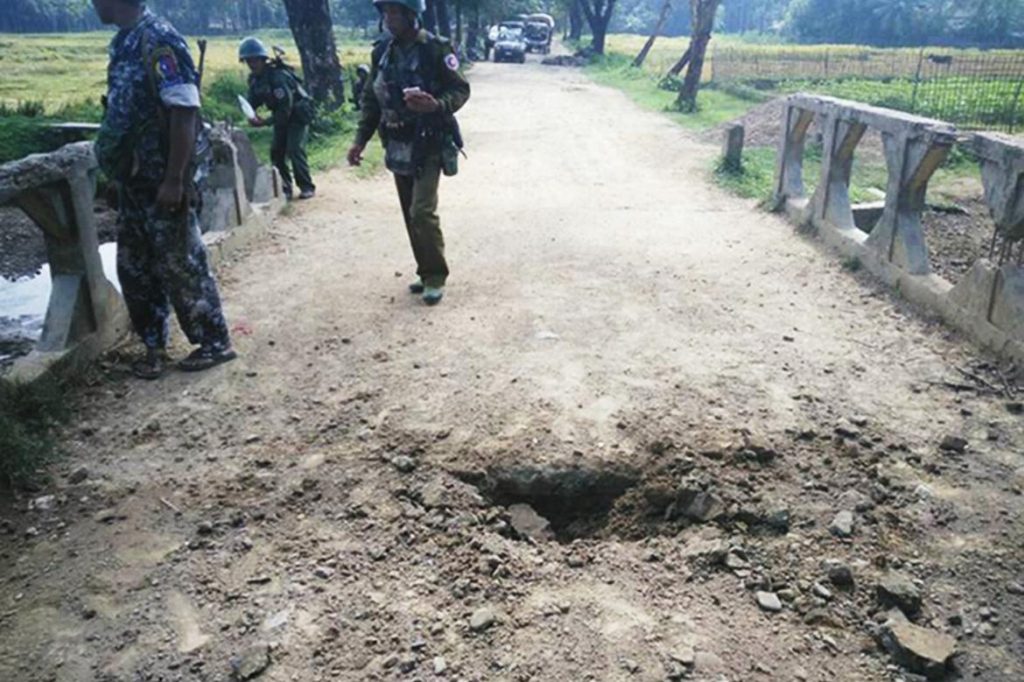By ATHENS ZAW ZAW | AFP
YANGON — Rakhine State was hit by fresh waves of violence over the weekend with more than 30 insurgents killed over two-days of fighting, the military said, as fears soar for the strife-torn region.
Northern Rakhine, which is home to the Muslim Rohingya minority and borders Bangladesh, has been under military lockdown ever since surprise raids on border posts left nine police dead last month.
Soldiers have killed scores and arrested many more in their hunt for the attackers, who the government says are radicalised Rohingya militants with links to overseas Islamists.
The crisis and reports of grave rights abuses being carried out in tandem with the security crackdown have piled international pressure on Myanmar’s new civilian government and raised questions about its ability to control the military.
Support more independent journalism like this. Sign up to be a Frontier member.
Days of apparent calm were shattered on Saturday when the army said six attackers and two soldiers were killed during a series of coordinated ambushes that were only beaten back with the help of helicopter gunships.
The toll then jumped on Sunday following further clashes.
In a statement Myanmar’s military said 22 attackers armed with swords were killed near Dar Gyi Zar village on Sunday morning after they charged at soldiers.
Six other insurgents were killed during clashes elsewhere in the state on Sunday, the statement added.
Authorities have heavily restricted access to the area, making it difficult to independently verify government reports or accusations of army abuse.
Crisis deepens
On Saturday evening, Rohingya activists uploaded a graphic video showing the corpses of eight people dressed in civilian clothes, including a small baby.
The video’s shooter, speaking in Rohingya, said the victims died that day near Dar Gyi Zar village, with some showing bullet wounds.
It was not possible to verify the authenticity of the footage.
The resurgence of violence in western Rakhine has deepened and complicated a crisis that already posed a critical challenge to the new administration led by State Counsellor Daw Aung San Suu Kyi.
The state has sizzled with religious tension ever since waves of violence between the majority Buddhist population and the Muslim Rohingya left more than 200 dead in 2012.
More than 100,000 people, mostly Rohingya, were pushed into displacement camps by the bloodshed and have languished there ever since.
Rights groups say they face apartheid-like restrictions on movement and have repeatedly called on Suu Kyi to carve out a solution.
But Buddhist nationalists at home viciously oppose any move to grant them citizenship, claiming the Rohingya are illegal immigrants from Bangladesh despite their long roots in the country.
The latest surge in fighting came as new satellite images released by Human Rights Watch on Sunday showed what the group said was evidence of mass arson attacks against Rohingya villages.
Their analysis showed more than 400 buildings torched in three Rohingya villages where the fighting has been taking place.
The group said active fires and burn scars showed that most of the destruction was caused by arson. The latest images were taken on 10 November.
Brad Adams, the group’s Asia director, said the new photos showed “widespread destruction” that was “greater than we first thought”.
“Burmese authorities should promptly establish a UN-assisted investigation as a first step toward ensuring justice and security for the victims,” he said in a statement.
The military and government have rejected allegations that troops have burned Rohingya villages, accusing insurgents of lighting the fires.







